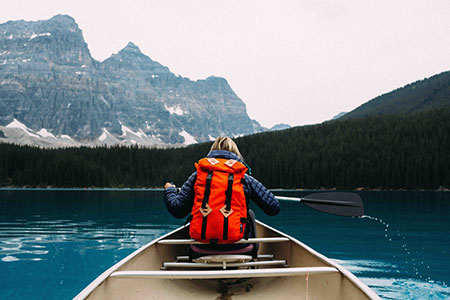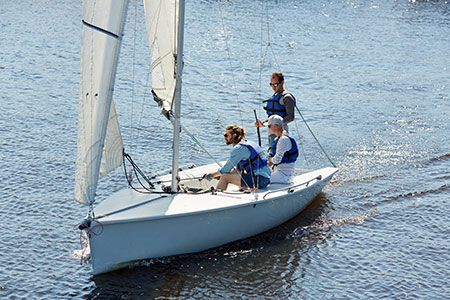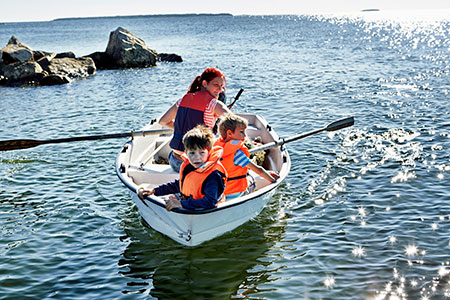Author: BBOAT-Admin
They Were Doing it all “Wrong”!
I learned about boating from… A boy!
Actually, it was a boyfriend of my mother’s when I was about 12. He was an “outdoors man”, who loved to hike, ski, camp, and canoe-so naturally we became “outdoorsy” too. Canoeing was GREAT, and I took to it almost immediately.
I do not remember wearing lifejackets.
I remember two adults, two kids, 1 dog, and a boatload of gear (we were likely way overpacked)
I remember paddling on a large lake, with big waves, wind, and rain. It was so windy and heavily raining, that my brother and I were told to lie down (it made the boat less tippy) and we were covered with a tarp (to keep the rain off us)
Shortly after that trip, I went to summer camp and was taught how to canoe by trained instructors. This is when I perhaps learned that the adults in my life had great intentions by taking us canoeing, but they were doing it all “wrong”!
I was taught safety, technique, and to always wear my PFD. I took these teachings back to my family. Maybe they were my first students!
Eventually, I became an instructor and guide and taught others how to paddle.
And now, I am the Executive Director of Paddle Canada, our National recreational paddling organization, and a Director of the Canadian Safe Boating Council-all because someone took me out in a boat!
Michelle McShane
“You Will Never Learn Everything There is to Know About Boating”
My late father, ex-Royal Australian Navy, WW11 and long-time recreational boater, once told me when we had gone ashore from the family cruising boat for a BBQ around the campfire when I was around 12 years old, that during your boating life you will never learn everything there is to know about boating!
I recall him saying that if anyone says they know it all, then it’s time to give up boating and try something else!
Every time we go out, whether it is by ourselves or with others, we will subconsciously learn something. No one day on the water is the same; different tides, breezes, winds, waves, swells, weather, surrounding boats, and people on board with you. We could go on and on with an entire range of variables. This is why we don’t stop learning.
Miles and then more miles under the keel is what counts. You can do every theory course ashore on offer, but there is nothing like the actual boating experience on the water to learn and perhaps confirm that classroom knowledge.
I recall changing sails in a tough Sydney to Hobart race years ago. It was blowing 40 knots and it was time to get the number 4 off and replace it with the storm jib. I went forward, got the sail down and laid across the top of it. The boat went through the next wave, picked the sail up that I was on top of and over the side I went, luckily still attached to my harness but a bit battered and bruised. When we finally got underway again one of the afterguard (always easy from back there!) told me the same had happened to him. I wish he had told me. Some years later in a similar situation, a mate did the same thing and I quickly told him to sit with his back to the bow and hang onto the sail instead of lying over it.
Recently, when setting a cray pot on the east coast of Tassie, I ventured into where the chart plotter said it would be ok, nothing marked so all good, pot baited and ready to go. “She’ll be right mate” I thought! Bang, a rock not marked on the plotter, and I had collected it! I knew that I shouldn’t rely on the plotter but took no action to simply look over the side. The result was a stainless prop that was well and truly twisted and bent and the need for a new gearbox on my Suzuki 150HP motor! So lesson learned, don’t rely on chart plotter and look. Having told a few others of my misfortune, they all knew “that rock” that’s not marked on the chart plotter and so do I now.
No doubt Dad was looking down and said “I told you so”.
With boating, you will never stop learning. Every trip is knowledge, every trip is a little more experience.
Peter Hopkins
“The Sea” Was in our Blood
As Newfoundlanders, my father and I were convinced that “the sea” was in our blood, so in the 1950s when I was a little girl growing up in England, my father was happy to give in to my pleas to rent a rowing boat and go out on a lake in our local park. The attendant pushed out the heavy wooden boat and we were off, my father at the oars, me nestled happily in the stern. There were no lifejackets or other safety equipment in the boat – the management was more concerned about having a megaphone loud enough so renters could hear “come in no. 7, your time is up!”
All went well until we reached the middle of the lake and noticed that the boat was slowly but surely filling with water – there was a small drainage hole in the hull and the plug was unaccountably missing. With the calm developed under fire when he served with the Royal Newfoundland Regiment of the British Army in World War 2, my father immediately started rowing much more purposefully back towards the shore, all the time keeping up happy chatter with me (“well – – this is an exciting adventure!”) to prevent my panicking.
Lesson learned: one of the CSBC’s key boating safety messages: Be prepared – you and your vessel.
Jean Murray




